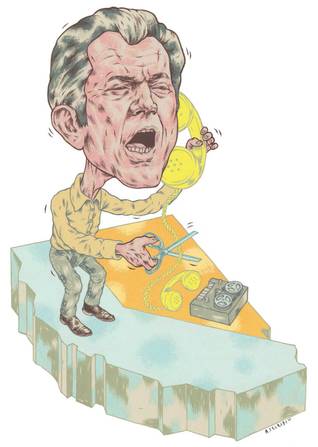
ANDREW DeGRAFF / SPECIAL TO THE SUN
Saturday, July 31, 2010 | 2 a.m.
The secretly recorded, profanity-laced telephone conversations purportedly capturing actor Mel Gibson threatening his ex-girlfriend could be admitted as evidence in a California courtroom if the “Braveheart” star is charged with domestic violence, but the tapes wouldn’t be admissible in Nevada.
Both states are among 12 in the nation that prohibit taping of phone conversations without consent of all parties involved in situations that don’t involve law enforcement wiretaps. The difference is California’s exception if the individual making the recording does so to obtain evidence related to certain crimes, including felonies involving violence.
The Clark County district attorney’s office and Metro Police would love for Nevada adopt a version of California Penal Code section 633.5 because they say it would make it easier to prosecute those accused of domestic violence. But criminal defense attorneys say existing state law is just fine because it protects privacy.
This is one of those issues where Nevada’s libertarian streak and distaste for personal intrusion shine through. Law enforcement agencies made repeated but unsuccessful attempts in the 1990s to persuade the Nevada Legislature to adopt a one-party consent law similar to the exception in California. The agencies have since given up trying, a decision made easier after the Nevada Supreme Court in 1998 upheld the state’s two-party consent law.
Gibson may well have wished he and ex-girlfriend Oksana Grigorieva lived in Nevada. The tabloids, both print and televised, and even some mainstream media have had a field day with the tapes. They were released this month in the midst of a child custody battle between Gibson and Grigorieva and a law enforcement investigation of the actor for an alleged altercation with Grigorieva in January. Gibson, in turn, has accused her of extortion.
This to-and-fro is precisely why the Nevada Network Against Domestic Violence doesn’t have a position on whether Nevada should adopt one-party consent to gather evidence. It’s not for lack of victims. The network, based in Reno, reported that 37,495 victims received services from domestic violence programs in Nevada in the fiscal year that ended July 1, 2009.
But the network’s executive director, Sue Meuschke, said her organization wouldn’t want victims to be placed in situations where they secretly record a phone call, only to have that boomerang in the form of an extortion charge or other type of retaliation.
“Certainly we understand that there are crimes like domestic violence that are committed behind closed doors, where it’s hard to get evidence,” she said.
Jurors, though, are often persuaded to vote for conviction based on audiotapes, Clark County District Attorney David Roger said.
“It would be so much easier to make a case with one-party consent,” Roger said.
Las Vegas criminal defense attorneys Richard Wright and Robert Langford see it differently. Wright is not even happy that Nevada law allows one person to secretly record another individual as long as they are face to face.
“There is an expectation of privacy in a conversation,” Wright said. “I’m just big on privacy.”
Without seeing the person being recorded or knowing whether there was some distraction, Langford said, there often is not enough context to know whether the recorded individual was expressing his true feelings or being sarcastic.
Besides, Langford said, if police want to gather evidence, they can simply hear one end of a phone conversation with one party’s permission without having to get it recorded.
“Technically, that’s not a wiretap,” he said. “Law enforcement can simply write down the responses.”

Join the Discussion:
Check this out for a full explanation of our conversion to the LiveFyre commenting system and instructions on how to sign up for an account.
Full comments policy